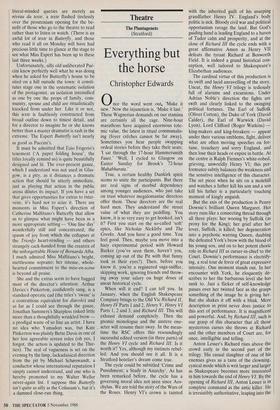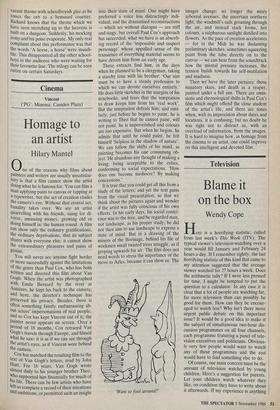Theatre
The Plantagenets (Stratford)
Everything but the horse
Christopher Edwards
0 nce the word went out., 'Make it new,' Now the injunction is, 'Make it last.' These Wagnerian demands on our stamina are certainly all the rage. Nine-hour marathons have acquired enormous tote- mic value, the latest in ritual communalis- ing (foyer creches cannot be far away). Sometimes you hear people swapping ordeal stories before they take their seats: `I sat through the 17-hour Hammersmith Faust."Well, I cycled to Glasgow on Easter Sunday for Brook's 72-hour
Mahabharata.' 1 True, a certain healthy Dunkirk spirit seems to unite the participants. But there are real signs of morbid dependency among younger audiences, who just take on trust whatever megalomaniac directors offer them. These directors are the real hard men. They understand the street value of what they are peddling. You know, it is so very easy to get hooked, isn't it? First you start on the so-called 'soft' epics, like Nicholas Nickleby and The Greeks. And you have a good time. You feel good. Then, maybe you move into a hazy experimental period with Howard Barker (you've seen them, haven't you, coming up out of the Pit with that funny look in their eyes?). Then, before you know it, you're a registered saga-sniffer, skipping work, ignoring friends and throw- ing away your salary on huge doses of uncut historical cycle.
When will it end? I can tell you. In January, when the English Shakespeare Company brings to the Old Vic Richard II, Henry IV Parts 1 and 2, Henry V, Henry VI Parts 1, 2 and 3, and Richard III. This will exhaust demand completely. Then the gnomic monologue and the austere one- acter will resume their sway. In the mean- time the RSC offers this resoundingly successful edited version (in three parts) of the Henry VI cycle and Richard III. Is it worth it? Yes, although my instincts rebel- led. And you should see it all. It is a Stratford hotelier's dream come true.
The cycle could be subtitled 'Crime and Punishment; a Study in Anarchy'. As has been remarked before, the cycle has a governing moral idea not seen since Aes- chylus. We are told the story of the Wars of the Roses. Henry VI's crown is tainted with the inherited guilt of his usurping grandfather Henry IV. England's body politic is sick. Bloody civil war and political opportunism ravage the land. But God's guiding hand is leading England to a haven of Tudor calm and prosperity, and at the close of Richard III the cycle ends with a great affirmative Amen as Henry VII defeats the tyrant Richard at Bosworth Field. It is indeed a grand historical con- ception, well tailored to Shakespeare's Elizabethan audiences.
The cardinal virtue of this production is its swift and lucid unravelling of the story. Uncut, the Henry VI trilogy is tediously full of alarums and excursions. Under Adrian Noble's direction the fights are swift and clearly linked to the swinging political fortunes. The Earl of Suffolk (Oliver Cotton), the Duke of York (David Calder), the Earl of Warwick (David Lyon), Lord Clifford (Roger Watkins) king-makers and king-breakers — appear under their various emblems, fight, deliver what are often moving speeches on for- tune, treachery and sorry England, and then lose their heads or expire in battle. At the centre is Ralph Fiennes's white-robed, grieving, unworldly Henry VI; this per- formance subtly balances the weakness and the sensitive intelligence of this character. The set piece when he sits on a molehill and watches a father kill his son and a son kill his father is a particularly touching moment of kingly anguish.
But the axis of the production is Penny Downie's brilliant Queen Margaret. Her story runs like a connecting thread through all three plays: her wooing by Suffolk (as proxy for the King); her grief after her lover, Suffolk, is killed; her degeneration into a psychotic warring Queen, daubing the defeated York's brow with the blood of his young son, and on to her potent choric role in Richard III as curser-in-chief to the Court. Downie's performance is electrify- ing, a real tour de force of great expressive intensity. One moment stands out. In her encounter with York, he eloquently de- scribes to her the barbarous level she has sunk to. Just a flicker of self-knowledge passes over her twisted face as she grasps something of the image he is giving her. But she shakes it off with a blink. Mere description in print never does justice to this sort of performance. It is magnificent and powerful. And, by Richard III, such is our grasp of this character that all those mysterious curses she throws at Richard and the other members of Court are, for once, intelligible and telling.
Anton Lesser's Richard rises above the crowd early in the second part of the trilogy. His casual slaughter of one of his enemies gives us a taste of the clowning, cynical mode which is writ larger and larger as Shakespeare becomes more interested in him towards the end of Henry VI. By the opening of Richard III, Anton Lesser is in complete command as the antic killer. He is irresistibly authoritative, leaping into the vacant throne with schoolboyish glee as he tosses the orb to a bemused courtier. Richard knows that the throne which we have seen stretching up, to the heavens is built on a dungeon. Suddenly, his mocking irony and his poise evaporate. My only real complaint about this performance was that the words 'A horse, a horse' were inaudi- ble. This disappointed all the other school- boys in the audience who were waiting for their favourite line. The trilogy can be seen entire on certain Saturdays.



































































 Previous page
Previous page